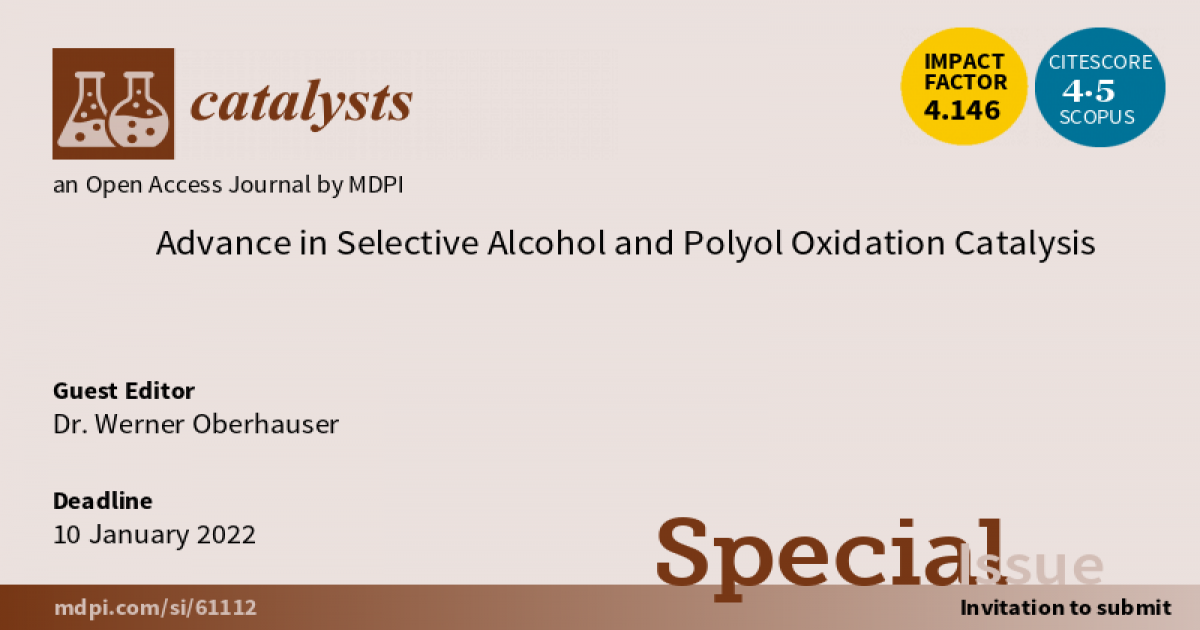Advance in Selective Alcohol and Polyol Oxidation Catalysis
A special issue of Catalysts (ISSN 2073-4344). This special issue belongs to the section "Catalysis in Organic and Polymer Chemistry".
Deadline for manuscript submissions: closed (10 January 2022) | Viewed by 22509

Special Issue Editor
Interests: synthesis of nanostructured catalysts; catalytic aerobic alcohol and polyol oxidation reactions; characterization of nanostructured materials by X-ray diffraction; high pressure NMR and IR spectroscopy
Special Issues, Collections and Topics in MDPI journals
Special Issue Information
Dear Colleagues,
The selective oxidation of alcohols to carbonyl compounds or organic acids is a fundamental functional group transformation, which is much more challenging in terms of conversion and selectivity when polyols, such as glycerol or sugar molecules, are used as the substrate. In fact, polyol oxidation reactions mainly occur under harsh reaction conditions and hence the development of robust recyclable catalysts, which maintain their activity and selectivity over time, is mandatory for a sustainable catalytic substrate conversion. The alcohol oxidation (dehydrogenation) reaction should ideally occur under acceptor-less conditions or use oxygen or unsaturated organic molecules of interest as a hydrogen acceptor.
This Special Issue welcomes original research articles and reviews dealing with any aspect of alcohol and polyol oxidation reactions. Topics of particular interest include:
- the synthesis and application of recyclable molecular catalysts for alcohol and polyol oxidation;
- the synthesis and application of well-defined metal nanoparticles localized on any type of solid support material for selective alcohol and polyol oxidation; and
- alcohol and polyol oxidation reactions conducted under aerobic conditions or that use other sustainable hydrogen acceptors.
Dr. Werner Oberhauser
Guest Editor
Manuscript Submission Information
Manuscripts should be submitted online at www.mdpi.com by registering and logging in to this website. Once you are registered, click here to go to the submission form. Manuscripts can be submitted until the deadline. All submissions that pass pre-check are peer-reviewed. Accepted papers will be published continuously in the journal (as soon as accepted) and will be listed together on the special issue website. Research articles, review articles as well as short communications are invited. For planned papers, a title and short abstract (about 100 words) can be sent to the Editorial Office for announcement on this website.
Submitted manuscripts should not have been published previously, nor be under consideration for publication elsewhere (except conference proceedings papers). All manuscripts are thoroughly refereed through a single-blind peer-review process. A guide for authors and other relevant information for submission of manuscripts is available on the Instructions for Authors page. Catalysts is an international peer-reviewed open access monthly journal published by MDPI.
Please visit the Instructions for Authors page before submitting a manuscript. The Article Processing Charge (APC) for publication in this open access journal is 2200 CHF (Swiss Francs). Submitted papers should be well formatted and use good English. Authors may use MDPI's English editing service prior to publication or during author revisions.
Keywords
- alcohol oxidation
- polyol oxidation
- supported metal–organic compounds
- supported metal nanoparticles
- oxygen
- recyclable catalysts
Benefits of Publishing in a Special Issue
- Ease of navigation: Grouping papers by topic helps scholars navigate broad scope journals more efficiently.
- Greater discoverability: Special Issues support the reach and impact of scientific research. Articles in Special Issues are more discoverable and cited more frequently.
- Expansion of research network: Special Issues facilitate connections among authors, fostering scientific collaborations.
- External promotion: Articles in Special Issues are often promoted through the journal's social media, increasing their visibility.
- e-Book format: Special Issues with more than 10 articles can be published as dedicated e-books, ensuring wide and rapid dissemination.
Further information on MDPI's Special Issue polices can be found here.





